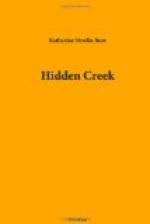At the end of the trees she saw a house, a three-sided, one-storied building of logs very pleasantly set in a circle of aspen trees, backed by taller firs, toppling over which stood a great sharp crest of rocky ledges, nine thousand feet high, edged with the fire of sunset. At one side of the house eight big dogs were leaping at the ends of their chains. They were tied to trees or to small kennels at the foot of trees. And, God be thanked! Sheila let fall her stone—they were all tied.
The door at the end of the nearest wing of the house opened and Miss Blake stood on the threshold and held up her hands. At sight of her the dogs stopped their howling instantly and cringed on their bellies or sat yawning on their bushy haunches. Miss Blake’s resonant, deep voice seemed to pounce upon Sheila above the chatter of the stream which, running about three sides of the glade, was now, at the silence of the dogs, incessantly audible.
“Well, if it isn’t the little barmaid!” cried Miss Blake, and advanced, wiping her hand on a white apron tied absurdly over the corduroy trousers and cowboy boots. “Well, if you aren’t as welcome as the flowers in May! So you thought you’d leave the street-lamps and come take a look at the stars?”
They met and Sheila took the strong, square hand. She was afflicted by a sudden dizziness.
“That’s it,” she faltered; “this time I thought I’d try—the stars.”
With that she fell against Miss Blake and felt, just before she dropped into blackness, that she had been saved by firm arms from falling to the ground.
CHAPTER IV
BEASTS
The city rippled into light. It bloomed, blossom on blossom, like some enchanted jungle under the heavy summer sky. Dickie sat on a bench in Washington Square. He sat forward, his hands hanging between his knees, his lips parted, and he watched the night. It seemed to him that it was filled with the clamor of iron-throated beasts running to and fro after their prey. The heat was a humid, solid, breathless weight—a heat unknown to Millings. Dickie wore his threadbare blue serge suit. It felt like a garment of lead.
There were other people on the benches—limp and sodden outlines. Dickie had glanced at them and had glanced away. He did not want to think that he looked like one of these—half-crushed insects,—bruised into immobility. A bus swept round the corner and moved with a sort of topheavy, tipsy dignity under the white arch. It was loaded with humanity, its top black with heads. “It ain’t a crowd,” thought Dickie; “it’s a swarm.” His eyes followed the ragged sky-line. “Why is it so horrible?” he asked himself—“horrible and beautiful and sort of poisonous—it plumb scares a fellow—” A diminished moon, battered and dim like a trodden silver coin, stood up above him. By tilting his head he could look directly at it through an opening in the dusty, electric-brightened boughs. The stars were pin-pricks here and there in the dense sky. The city flaunted its easy splendor triumphantly before their pallid insignificance. Tarnished purities, forgotten ecstasies, burned-out inspirations—so the city shouted raucously to its faded firmament.




